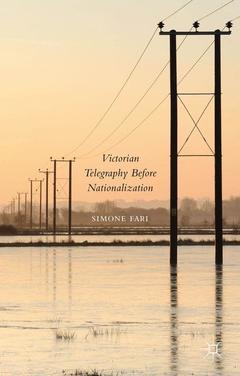Description
Victorian Telegraphy Before Nationalization, 1st ed. 2015
Author: Fari Simone
Language: English
Subjects for Victorian Telegraphy Before Nationalization:
Approximative price 94.94 €
In Print (Delivery period: 15 days).
Add to cart235 p. · 14x21.6 cm · Hardback
Description
/li>Contents
/li>Biography
/li>
1. The Origins Of The Telegraph Service
1.1. The Heroic Years
1.2. Experiments Along The Railroads
1.2.1. The London & Birmingham Railroad Company
1.2.2. The Great Western Railway Company
1.2.3. The Electric Telegraph Company
1.3. The Dynamics Of The Electric
1.3.1. Ties With The Past
1.3.2. The Venture
2. Constitutive Choices
2.1. 'Ne Tentes Aut Perfice'
2.2. The Optic V. The Electric Telegraph
2.3. The Pneumatic V. The Electric Telegraph
2.4. Gas Tubes And Electric Cables
2.5. The Penny Post
2.6. Railway And Telegraph
3. From Monopoly To Competition
3.1. The Electric Against All
3.2. The British: Litigation And Marketing
3.3. The Magnetic: Low Profile But High Technology
3.4. The Submarine And The European: Competition At Sea
3.5. The First Mover Supreme
3.6. The Effects Of The Constitutive Choices
4. The Duopoly
4.1. The Turning Point
4.2. The Electric's New Majority
4.3. The British/Magnetic Merger
4.4. The Consolidation Of The Duopoly
5. The Triumph Of The Oligopoly
5.1. Challenging The Duopoly
5.2. The Consolidation Of The Oligopoly
5.3. Submarine Telegraphy
6. Nationalization
6.1. Plans And Inquiries
6.2. Against Nationalization
6.3. The 1868 Telegraph Act
6.4. The 1869 Telegraph Act
6.5. The Reasons For Nationalization
6.6. A New Turning Point
Simone Fari is Assistant Professor of Economic History at the University of Granada, Spain. He has been Post-Doctoral Assistant at University of Lugano, Switzerland, and 'Earth Connected' Research Fellow at the London Science Museum, UK. He first studied telecommunications history at the University of Bari, Italy, and also studied financial history during a Post-Doctoral fellowship at the University of Torino, Italy. He has published A Penisola in Comunicazione (2008), as well as many articles in international reviews.




